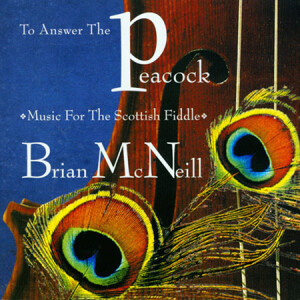 Debbie Skolnik wrote this review.
Debbie Skolnik wrote this review.
This CD is subtitled “Music For The Scottish Fiddle,” and that’s exactly what it’s all about – the fiddle takes center stage in this recording, dancing its heart out, strutting its stuff like … well, like the peacock of the CD’s title. It takes a breather every now and then, mind you. In McNeill’s hands, the fiddle is a living being, not just a beautifully carved piece of wood with strings.
I am not usually a fan of all-instrumental albums (except when it comes to classical music), finding them often to be rather monotonous; but I had to lay that prejudice aside after hearing this one. Monotonous is the last word anyone could use about this album. The tunes are inventive, beautifully played (and McNeill’s multi-instrumental capabilities shine – he plays most of the instruments heard on this album, although he is joined by Jed Grimes on guitar for four tracks) and, above all, heartfelt. McNeill’s relationship with his music is so personal and so honest, it sometimes feels like eavesdropping into his soul to listen to him play. But since he’s recorded these for us to hear, I guess he doesn’t mind. McNeill coaxes warm, rich tones the color of rosin out of his fiddle, and he plays with such honesty and emotion that it is impossible not to be moved when you listen to this album.
The lively, lilting title track opens the album. It is essentially a syncopated round, commencing with a haunting solo fiddle tune, later joined by McNeill double-tracking his harmony. This musical theme returns on the last track of the album, ushering in something very special: McNeill is not just a very fine musician, but an equally good writer. He treats us to the first chapter from his novel also titled To Answer The Peacock, which is the second book in his series about Alex Fraser, busker extraordinaire. It won’t surprise you to know that Fraser’s instrument of choice is, of course, the fiddle. I don’t want to spoil it for you, but after hearing the first chapter, I wished for two things: 1) my own copy of the book (which is forthcoming and which I will be reviewing for you as soon as I’ve read it), and 2) that McNeill would record himself reading the entire book out loud, I enjoyed his recital so much. But you get 17 minutes and 31 seconds of it on this disc, as well as lots of fine music – a real bargain.
“The Fallen Angel Set” is a quartet of nimbly played dance tunes. I defy you to sit still when they’re on. At the very least, you have to tap your feet or your fingers if you’re listening to this where dancing is not the done thing.
The third track, “Quodlibet,” is one of the few tunes not penned by McNeill himself. Originally meant as the accompaniment to words written by Robert Burns, it was actually written by Dick Gaughan, a good friend of McNeill’s as well as former bandmate in the infuential Scottish group Clan Alba. “Peace and Plenty” is a reflective, slower tune, the kind that goes along well with sitting and looking out a window, and perhaps pondering the bittersweet nature of life or thinking whatever thoughts you need to think at the time.
An Eastern European minor-key tonality is the signature of “Czarlie Is My Darling,” reminding the listener that the fiddle is one of those instruments that belong to many cultures and many types of music. It is played in a style that sounds more like classical music than most of the tunes on this album, but then it segues into a rather unexpected uptempo hoe-down romp he calls “These Boots Were Made For Walkinshaw.” In case you haven’t already guessed it, McNeill enjoys punning! There’s more to the story than that, but I’d ruin your enjoyment of the liner notes if I tell you anymore.
Another notable song is “Bill Malley’s Schottische” (oddly enough, McNeill tells us it’s a traditional Irish, not Scottish, music tune, although he suspects some Scottish ancestry somewhere). He uses the bass masquerading as a bagpipe drone to anchor it; it’s paired with “The Balmain Ball” (which McNeill says is named after a culinary specialty prepared in the kitchens of Balmain House in Inverness).
I could continue with a track-by-track analysis of this album but at this point I hope I’ve whetted your appetite enough that you will want to discover the rest of it yourself. It’s an album I have happily listened to many times since I got it, and it rewards me with something new every time I play it. I hope you can hear the magic too.
(Greentrax, 1999)
McNeill has a Web site. There you can learn about all of the other fine music he’s produced, including another album, No Gods, I’ve reviewed for Folk Tales.
